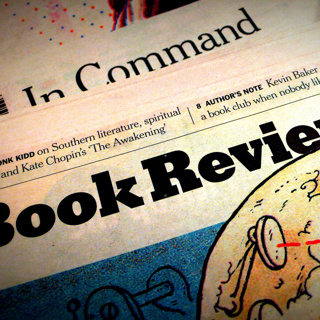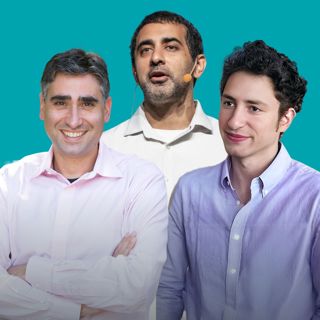
Writers Writing, Readers Reading, Creators Creating
We've been financing good writing with bad advertising -- and "attention monsters" (to quote Craig Mod) for way too long. So what happens when the technology for creators finally falls into place? We're finally starting to see shift in power away from publications as the sole gatekeepers of talent, towards individual writers. Especially when the best possible predictor of the value of a piece of writing is, well, the writer. The publication's brand is no longer the guarantee of quality, or the only entity we should be paying and be loyal to, when a new ecosystem is forming around the direct relationship between consumers, content creators, and the tools and business models to facilitate all this.So where do readers come in... how do they find signal in the noisy world of drive-by billboard advertising, "attention-monster" feeds, and the death of Google Reader? Particularly as machine learning-based translation, summarization, and other mediums beyond text increasingly enter our information diets, for better and for worse?This episode of the a16z Podcast features Robert Cottrell, formerly of The Economist and Financial Times and now editor of The Browser (which selects 5 pieces of writing worth reading delivered daily); Chris Best, formerly CTO of Kik and now co-founder and CEO of Substack (a full-stack platform for independent writers to publish newsletters, podcasts, and more); and Andrew Chen, formerly independent blogger/ newsletter publisher, now also an a16z general partner investing in consumer -- all in conversation with Sonal Chokshi. The discussion is all about writing and reading... but we're not just seeing this phenomenon in newsletters and podcasting, but also in people setting up e-commerce shops, video streaming, and more. Is it possible that the stars, the incentives, are finally aligning between creators and consumers? What happens next, what happens when you get more than -- and even less than -- "1000 true fans"? image: Thad Zajdowicz/ Flickr
27 Jan 202040min

What's Next for the Internet?
How can we evolve the web for a better future? Has the web become a mature platform — or are we still in the early days of knowing what it can do and what role it might have in our lives? Just as “social/local/mobile” once did, what are the new trends — like crypto and blockchain networks and commerce everywhere — that might converge into new products and experiences?Chris Dixon (general partner at a16z and co-lead of the a16z crypto fund) discusses all things internet with Jonah Peretti (founder and CEO of BuzzFeed). Their conversation ranges from the early days of the web to the way innovation happens (what Chris calls “outside-in vs inside-out”) to the promise of a community-owned and operated internet, and more.Together they explore the possibilities that could co-evolve and converge are we enter into the next era of the web, and they share how we might not be quite as far removed from the “wild west days” of the internet as we imagined.
19 Jan 202041min

Controlling AI
AI can do a lot of specific tasks as well as, or even better than, humans can — for example, it can more accurately classify images, more efficiently process mail, and more logically manipulate a Go board. While we have made a lot of advances in task-specific AI, how far are we from artificial general intelligence (AGI), that is AI that matches general human intelligence and capabilities?In this podcast, a16z operating partner Frank Chen interviews Stuart Russell, the Founder of the Center for Human-Compatible Artificial Intelligence (CHAI) at UC Berkeley. They outline the conceptual breakthroughs, like natural language understanding, still required for AGI. But more importantly, they explain how and why we should design AI systems to ensure that we can control AI, and eventually AGI, when it’s smarter than we are. The conversation starts by explaining what Hollywood's Skynet gets wrong and ends with why AI is better as "the perfect Butler, than the genie in the lamp."
16 Jan 202026min

Food, Drugs, and Tech—100 Years of Public Health
The federal agency known as the FDA, or the Food and Drug Administration, was born over 100 years ago—at the turn of the industrial revolution, in a time of enormous upheaval and change, and rapidly emerging technology. The same could be said to be just as true today. From CRISPR to synthetic biology to using artificial intelligence in medicine, our healthcare system is undergoing massive amounts of innovation and change. Covering everything from gene-editing your dog to tracking the next foodborne outbreak, this wide-ranging conversation between Principal Commissioner of the FDA Amy Abernethy and Vijay Pande, GP on the Bio Fund at a16z, discusses how the agency is evolving to keep pace with the scientific breakthroughs coming, while staying true to its core mission of assessing safety and effectiveness for consumers in the world of food and medicine. Highlights:What the FDA looks like today and the key steps of the FDA process to getting a drug/product to market [2:20] How to manage a culture when mitigating risk is a top priority while aiming to innovate for the future [5:22] Creative problem-solving in times of crisis, such as the Opioid crisis [9:58] Preparing for and preventing drug shortages at scale [13:30] How advances in bioengineering are transforming healthcare [16:00] How the FDA is thinking about n=1 therapies and its applications in the future [18:54] The future of healthcare privacy [26:10] The ways the clinical trial process are shifting [29:26] Innovations in Bioengineering as they relate to regulating food in the future [36:02] How the FDA handles foodborne illnesses and its plans to innovate food safety [39:12] Discussion about the next 100 years of the FDA [41:25]
14 Jan 202044min

On Pharma Trends and Big Company Innovation
How does the world’s largest producer of medicines in terms of volume balance the science and the business of innovation? How does an enterprise at such vast scale make decisions about what to build vs. buy, especially given the fast pace of science today? How does it balance attitudes between “not invented here” and “not invented yet”?Vas Narasimhan, CEO of Novartis, sat down with a16z bio general partners Jorge Conde and Vijay Pande, and editor in chief Sonal Chokshi, during the JP Morgan Healthcare Conference around this time last year, to discuss the latest trends in therapeutics; go to market and why both big companies and bio startups need to get market value signals (not just approvals!) from payers earlier in the process; clinical trials, talent, leadership, and more in this rerun of the a16z Podcast. image: Global Panorama/ Flickr
11 Jan 202059min

Personal Genomics: Where Are We, Really?
This is a turn of the decade (and January-themed) look backward/ look forward into personal genomics, given recent and past retrospective and prospective pieces in the media on the promise, and perils, of the ability to sequence one's DNA: What did it, and does it, mean for personalized medicine, criminal investigations, privacy, and more?General partner Jorge Conde, who has a long history in the space, covers everything from where genealogy databases and large datasets come in to fetal testing, multi-omics, and other themes spanning the past, present, and future of personal genomics in conversation with Sonal Chokshi for episode #18 our news show 16 Minutes, where we cover recent headlines, the a16z way, from our vantage point in tech -- and especially what's hype/ what's real. While we typically cover multiple headlines, this is one of our special deep-dive episodes on a single topic. (You catch up on other such deep dives, on the opioid crisis and other evergreen episodes, at a16z.com/16Minutes). And if you haven't already, be sure to subscribe to the separate feed for "16 Minutes" to continue getting new episodes. image: Petra Fritz / Flickr
6 Jan 202019min

Why We Should Be Optimistic About the Future
Many skeptics thought the internet would never reach mass adoption, but today it’s shaping global culture, is integral to our lives -- and it's just the beginning. In this conversation from our 2019 innovation summit, Kevin Kelly (Founding Executive Editor, WIRED magazine) and Marc Andreessen sit down to discuss the evolution of technology, key trends, and why they're the most optimistic people in the room.***The views expressed here are those of the individual AH Capital Management, L.L.C. (“a16z”) personnel quoted and are not the views of a16z or its affiliates. Certain information contained in here has been obtained from third-party sources, including from portfolio companies of funds managed by a16z. While taken from sources believed to be reliable, a16z has not independently verified such information and makes no representations about the enduring accuracy of the information or its appropriateness for a given situation.This content is provided for informational purposes only, and should not be relied upon as legal, business, investment, or tax advice. You should consult your own advisers as to those matters. References to any securities or digital assets are for illustrative purposes only, and do not constitute an investment recommendation or offer to provide investment advisory services. Furthermore, this content is not directed at nor intended for use by any investors or prospective investors, and may not under any circumstances be relied upon when making a decision to invest in any fund managed by a16z. (An offering to invest in an a16z fund will be made only by the private placement memorandum, subscription agreement, and other relevant documentation of any such fund and should be read in their entirety.) Any investments or portfolio companies mentioned, referred to, or described are not representative of all investments in vehicles managed by a16z, and there can be no assurance that the investments will be profitable or that other investments made in the future will have similar characteristics or results. A list of investments made by funds managed by Andreessen Horowitz (excluding investments for which the issuer has not provided permission for a16z to disclose publicly as well as unannounced investments in publicly traded digital assets) is available at https://a16z.com/investments/.Charts and graphs provided within are for informational purposes solely and should not be relied upon when making any investment decision. Past performance is not indicative of future results. The content speaks only as of the date indicated. Any projections, estimates, forecasts, targets, prospects, and/or opinions expressed in these materials are subject to change without notice and may differ or be contrary to opinions expressed by others. Please see https://a16z.com/disclosures for additional important information.
2 Jan 202044min

What to Know about CFIUS
When innovation and capital go global, so do restrictions on trade, foreign investment, and more. Over the past couple years, U.S. policymakers have expanded the scope of the Committee on Foreign Investment in the U.S. (CFIUS) through the Foreign Investment Risk Review Modernization Act (FIRRMA) of 2018 which was recently updated through proposed reforms this September 2019.So what does this all mean for tech founders taking investments from, or doing joint ventures with, foreign entities -- or just doing business globally in general? What does and doesn't CFIUS cover, and how might one structure partnerships strategically as a result? In this episode, a16z general partner Katie Haun interviews Michael Leiter (of law firm Skadden Arps) who specializes in CFIUS as well as matters involving U.S. national security and cybersecurity, cross-border transactions, aerospace and defense mergers and acquisitions, and government relations and investigations.The Q&A took place in September 2019 as part of an event hosted by Andreessen Horowitz. The views expressed here are those of the individual AH Capital Management, L.L.C. (“a16z”) personnel quoted and are not the views of a16z or its affiliates. Certain information contained in here has been obtained from third-party sources, including from portfolio companies of funds managed by a16z. While taken from sources believed to be reliable, a16z has not independently verified such information and makes no representations about the enduring accuracy of the information or its appropriateness for a given situation.This content is provided for informational purposes only, and should not be relied upon as legal, business, investment, or tax advice. You should consult your own advisers as to those matters. References to any securities or digital assets are for illustrative purposes only, and do not constitute an investment recommendation or offer to provide investment advisory services. Furthermore, this content is not directed at nor intended for use by any investors or prospective investors, and may not under any circumstances be relied upon when making a decision to invest in any fund managed by a16z. (An offering to invest in an a16z fund will be made only by the private placement memorandum, subscription agreement, and other relevant documentation of any such fund and should be read in their entirety.) Any investments or portfolio companies mentioned, referred to, or described are not representative of all investments in vehicles managed by a16z, and there can be no assurance that the investments will be profitable or that other investments made in the future will have similar characteristics or results. A list of investments made by funds managed by Andreessen Horowitz (excluding investments for which the issuer has not provided permission for a16z to disclose publicly as well as unannounced investments in publicly traded digital assets) is available at https://a16z.com/investments/.Charts and graphs provided within are for informational purposes solely and should not be relied upon when making any investment decision. Past performance is not indicative of future results. The content speaks only as of the date indicated. Any projections, estimates, forecasts, targets, prospects, and/or opinions expressed in these materials are subject to change without notice and may differ or be contrary to opinions expressed by others. Please see https://a16z.com/disclosures for additional important information.
23 Dec 201946min






















